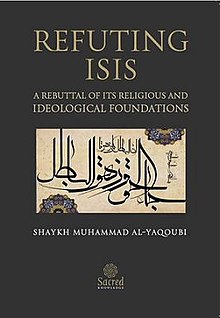Jihad is an Arabic word which literally means "striving" or "struggling", especially with a praiseworthy aim. In an Islamic context, it can refer to almost any effort to make personal and social life conform with God's guidance, such as struggle against one's evil inclinations, proselytizing, or efforts toward the moral betterment of the Muslim community (Ummah), though it is most frequently associated with war. In classical Islamic law (sharia), the term refers to armed struggle against unbelievers, while modernist Islamic scholars generally equate military jihad with defensive warfare. In Sufi circles, spiritual and moral jihad has been traditionally emphasized under the name of greater jihad. The term has gained additional attention in recent decades through its use by various insurgent Islamic extremist, militant Islamist, and terrorist individuals and organizations whose ideology is based on the Islamic notion of jihad.
Political aspects of Islam are derived from the Quran, ḥadīth literature, and sunnah, the history of Islam, and elements of political movements outside Islam. Traditional political concepts in Islam include leadership by elected or selected successors to Muhammad, known as Caliphs in Sunnī Islam and Imams in Shīʿa Islam; the importance of following the Islamic law (sharīʿa); the duty of rulers to seek consultation (shūrā) from their subjects; and the importance of rebuking unjust rulers.
Liberalism and progressivism within Islam involve professed Muslims who have created a considerable body of progressive thought about Islamic understanding and practice. Their work is sometimes characterized as "progressive Islam". Some scholars, such as Omid Safi, differentiate between "Progressive Muslims" and "Liberal advocates of Islam".
Qutbism is an Islamist ideology which was developed by Sayyid Qutb, a leading member of the Muslim Brotherhood who was executed by the Egyptian government in 1966. It has been described as advancing the extremist, jihadist ideology of propagating "offensive jihad" – waging jihad in conquest – "armed jihad in the advance of Islam", and simply "Islamic-based terrorism".
Takfir or takfīr is an Arabic and Islamic term which denotes excommunication from Islam of one Muslim by another, i.e. accusing another Muslim to be an apostate. The word is found neither in the Quran nor in the ḥadīth literature; instead, kufr ("unbelief") and kāfir ("unbeliever") and other terms employing the same triliteral root k-f-r appear. "The word takfīr was introduced in the post-Quranic period and was first done by the Khawarij," according to J. E. Campo. The act which precipitates takfīr is termed mukaffir. A Muslim who declares another Muslim to be an unbeliever or apostate is a takfīri ("excommunicational").
Takfiri is an Arabic and Islamic term denoting a Muslim who excommunicates one of his/her coreligionists, i.e. who accuses another Muslim of being an apostate. Since according to the traditional interpretations of Islamic law (sharīʿa) the punishment for apostasy is the death penalty, and potentially a cause of strife and violence within the Muslim community (Ummah), an ill-founded accusation of takfīr is considered a major forbidden act (haram) in Islamic jurisprudence, with one ḥadīth declaring that one who wrongly declares another Muslim to be an unbeliever is himself an apostate. Takfirism has been called a "minority ideology" which "advocates the killing of other Muslims declared to be unbelievers".
Abū al-Ḥasan al-Ashʿarī, often reverently referred to as Imām al-Ashʿarī by Sunnī Muslims, was an Arab Muslim scholar of Shafi jurisprudence, scriptural exegete, reformer (mujaddid), and scholastic theologian (mutakallim), renowned for being the eponymous founder of the Ashʿarite school of Islamic theology.

Islamic views on slavery represent a complex and multifaceted body of Islamic thought, with various Islamic groups or thinkers espousing views on the matter which have been radically different throughout history. Slavery was a mainstay of life in pre-Islamic Arabia and surrounding lands. The Quran and the hadith address slavery extensively, assuming its existence as part of society but viewing it as an exceptional condition and restricting its scope. Early Islamic dogma forbade enslavement of free members of Islamic society, including non-Muslims (dhimmis), and set out to regulate and improve the conditions of human bondage. Islamic law regarded as legal slaves only those non-Muslims who were imprisoned or bought beyond the borders of Islamic rule, or the sons and daughters of slaves already in captivity. In later classical Islamic law, the topic of slavery is covered at great length. Slaves, be they Muslim or those of any other religion, were equal to their fellow practitioners in religious issues.
Owais al-Qarani, also spelled Uways or Owais, was a Muslim from Yemen who lived during the lifetime of the Islamic prophet Muhammad.
The rules and regulations concerning prisoners of war in Islam are covered in manuals of Islamic jurisprudence, based upon Islamic teachings, in both the Qur'an and hadith.

The Islamic State (IS), also known as the Islamic State of Iraq and the Levant, Islamic State of Iraq and Syria, and by its Arabic acronym Da'ish or Daesh, is a militant Islamist group and former unrecognized quasi-state that follows the Salafi jihadist branch of Sunni Islam. It was founded by Abu Musab al-Zarqawi in 1999 and gained global prominence in 2014, when it drove Iraqi security forces out of key cities during the Anbar campaign, which was followed by its capture of Mosul and the Sinjar massacre. The organization significantly revamped the course of the Syrian civil war when it announced its expansion into Syria in mid-2013 and began conducting ground attacks against both Syrian government forces and Syrian opposition militias. By the end of 2015, it held an area that contained an estimated eight to twelve million people and stretched from western Iraq to eastern Syria, where it enforced its interpretation of Islamic law. ISIL was estimated at the time to have an annual budget of more than US$1 billion and more than 30,000 fighters.
Islamic revival refers to a revival of the Islamic religion. The revivers are known in Islam as mujaddids.
The ideas and practices of the leaders, preachers, and movements of the Islamic revival movement known as Islamism have been criticized by non-Muslims and Muslims.

Salafi jihadism, also kown as Revolutionary Salafism or jihadist-Salafism, is a transnational, religious-political Sunni Islamist ideology, seeking to establish a global caliphate, characterized by the advocacy of "physical" (military) jihadist attacks on non-Muslim and (takfired) Muslim targets, and the Salafist interpretation of sacred Islamic texts "in their most literal, traditional sense", to bring about the return to "true Islam".
The use of politically and religiously-motivated violence dates back to the early history of Islam, its origins are found in the behavior, sayings, and rulings of the Islamic prophet Muhammad, his companions, and the first caliphs in the 7th, 8th, and 9th centuries CE. Mainstream Islamic law stipulates detailed regulations for the use of violence, including corporal and capital punishment, as well as how, when, and against whom to wage war.

Muhammad Abul Huda al-Yaqoubi is a Syrian Islamic scholar and religious leader. He has opposed both Bashar al-Assad and Abu Bakr al-Baghdadi.

Mohammed Said Ramadan Al-Bouti was a notable Sunni Muslim scholar who was also known as "Shaykh of the Levant". He was killed during the Syrian civil war, reportedly in a bomb explosion, though "many questions about the death" have been raised by videos of the scene.
The ideology of the Islamic State, sometimes called Islamic Statism, has been described as being a hybrid of Salafism, Salafi jihadism, Sunni Islamist fundamentalism, Wahhabism, and Qutbism. Through its official statement of beliefs originally released by its first leader Abu Omar al-Baghdadi in 2007 and subsequently updated since June 2014, IS defined its creed as "a middle way between the extremist Kharijites and the lax Murji'ites".

Hazimism, also referred to as the Hazimi movement or known as the hazimiyyah or Hazimi current, is an extremist strand of Wahhabism based on the teachings of the Saudi-born Muslim scholar Ahmad ibn Umar al-Hazimi. Hazimis believe that those who do not unconditionally excommunicate (takfir) unbelievers are themselves unbelievers, which opponents argue leads to an unending chain of takfir.". Its spread within ISIS triggered prolonged ideological conflict within the group, pitting its followers against the moderate faction led by Turki al-Binali. The movement was eventually branded as extremist by ISIS, who initiated a crackdown on its followers.
Islamic neo-traditionalism is a contemporary strand of Sunni Islam that emphasizes adherence to the four principal Sunni schools of law (madhahib), belief in one of the Ash'ari, Maturidi and Athari schools of theology and the practice of tasawuff (Sufism), which its followers consider to be representative of the classical Sunni tradition.





